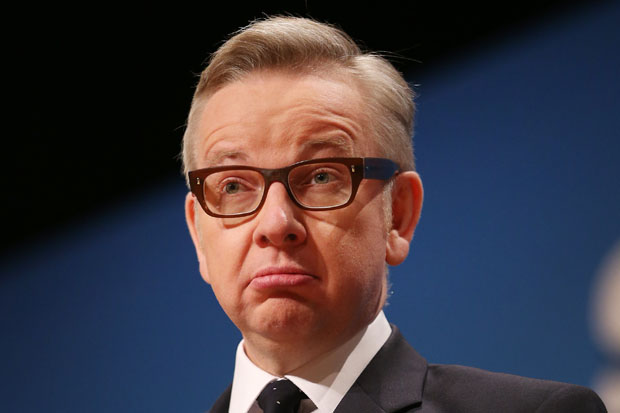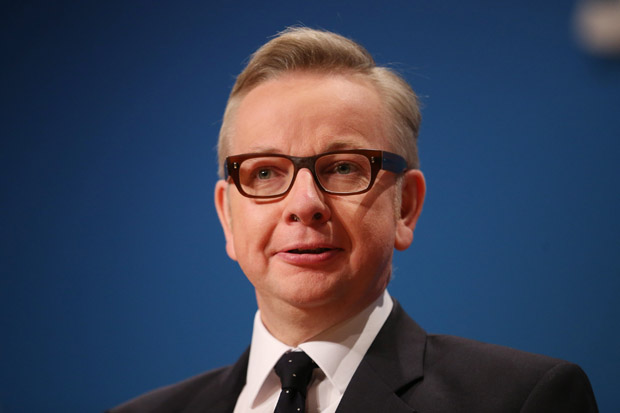‘Michael Gove,’ the joke goes, ‘you either loathe him or hate him.’ According to one poll (by Ipsos Mori) the former education secretary is by far the most unpopular politician in Parliament, with a net likeability rating of minus 32. A video of him falling over has been watched 487,000 times on YouTube, you can buy crocheted pin cushions of his head for £25 and teaching groups loudly accuse him of ‘doing to children what Thatcher did to the miners’.
So why does my mother love him? It’s pretty simple. She’s been a primary school teacher for more than 20 years, and she says her pupils are producing better work than they ever have thanks to his reforms. She would never admit it in the staff room, and is nervous that I will ‘out her’ in this article, but she is adamant that what she says is true. What’s more, she says, she’s not alone. Up and down the land, there are silent but highly motivated clusters of teachers, guerrilla fighters for Gove.
Last month, home for a visit and stuck for anything to read, I picked up the diaries written by her Year One class. One, a six-year-old, had written a Hilaire Belloc-style account of what he had for breakfast — which began sedately, with cereal, before plunging into a regime of chocolate donuts, thence to a violent tummy ache and a trip to the doctor. It had me laughing, properly laughing, it was so vividly and beautifully written. There were 30 of these accounts and each was remarkable in some way, whether in the quality of its spelling, handwriting or imagination. It was so much better than any work I had previously read that I asked her what had changed.
‘Gove,’ she said. ‘It’s simple. Because of him, children are expected to work at a higher level.’ It’s what independent schools like Eton have always known — children can do better if we expect more of them.
It wasn’t so long ago that things were very different. Under a Labour administration, at a different school, my mother was severely criticised for trying to ‘teach’ children of reception age. Although the parents thought this was a very good idea, Ofsted didn’t. Visiting that classroom one day I pointed out the word ‘caterpillar’ had been misspelled, prominently, on the wall. With a desperate, harassed look, she said she couldn’t take it down for fear of upsetting the teaching assistant who had written it. My mother had lost all confidence in herself. She doesn’t vote Tory; she didn’t know that what she needed was Govean reform.
At around the same time, my inspirational A-level English teacher packed it in altogether. She was no longer doing what she did best; she was working on a supermarket checkout. Nowadays, she might be able to pass on her deep love of verse to comprehensive school pupils with total impunity. But under New Labour, the teachers who were lauded were her very antithesis. New Labour’s teaching heroes were in the mould of ‘outstanding’ English teacher, Liz Palmer, who penned a column for the Guardian last July explaining that she was quitting the profession — to run a ski chalet — because Michael Gove was forcing her to teach… romantic poetry. ‘I cannot stand in front of the classroom,’ she wrote, ‘and make children chant the work of Keats, instilling them in the belief that the only voices worth hearing in our society are those of a dead, white, English, male establishment figure.’
‘Gove has put rigour back into teaching,’ explains a highly experienced teacher at a London state school, who did not want to be named. ‘The exams have got harder — but that’s right, they should have done. The expectations have gone up and I think most teachers, even the ones who say they hate Gove, now accept that previous expectations were too low.’
Recently trained teachers, who joined the profession since the last election, are often unaware of how low expectations used to be. A friend teaches Ancient Greek at a London state school, where candidates are queuing up to get into Oxbridge, and sees nothing extraordinary in it. Ordinary kids embracing Pericles used to be the stuff of Boris Johnson’s dreams — the only person I know who learnt Ancient Greek at school went to Eton, with Prince William.
At Queens’ School, Bushey, in Hertfordshire, Kevin Rooney (who coaches the school’s outstanding debating team) was recently asked to explain to civil servants at the Department of Education why his students so consistently outperform their private school opponents. Rooney said: ‘All over the country you have pockets of very dedicated teachers and kids with a bit of aspiration. Put those two together and hey presto! Under the last government we were being utterly micromanaged in how we taught our lessons. Gove trusted teachers to a greater extent and didn’t want us to jump through all these useless hoops.’
Pupils excelling; teachers beginning to understand the reforms — it’s all exciting stuff, except that a change of government in May might ruin everything. You would expect a Labour politician to champion the rights of working-class children, to ensure that they get the best education possible, but the irony is that it’s Tristram Hunt, the Labour shadow education secretary, who seems not to care if poorer children have no access to the humanities.
Kevin Rooney agrees. ‘I’m so left-wing I fall off the scale, but Labour are the most philistine group of people I’ve ever seen. They want to use education to solve every broader social and political problem — from teenage pregnancies to low voter turnout — everything except the main issue, which is educating young people. When I was at school in the heart of republican West Belfast, I may have been poor and working class, but we were taught our Shakespeare, our Plato and Aristotle.
‘Right now, teaching feels exciting — it’s as if a door has opened and there is light coming through.’
Got something to add? Join the discussion and comment below.
Get 10 issues for just $10
Subscribe to The Spectator Australia today for the next 10 magazine issues, plus full online access, for just $10.
You might disagree with half of it, but you’ll enjoy reading all of it. Try your first month for free, then just $2 a week for the remainder of your first year.















Comments
Don't miss out
Join the conversation with other Spectator Australia readers. Subscribe to leave a comment.
SUBSCRIBEAlready a subscriber? Log in